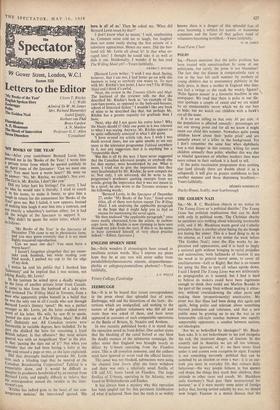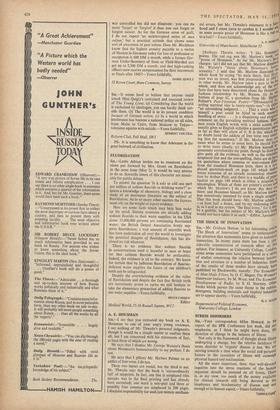THE GOLDEN NAZI SIR,—Mr. R. C. Blackham objects to my
notice on The Young Lions as 'a political diatribe.' The Young Lions has political implications that can be dealt with only in political terms. The Christian charity he mentions says nothing about tolerating intolerable evils, and if Mr. Blackham wants good old Catholic principles there is another about hating the sin though not hating the sinner. This is a hard thing to do in the cinema, as I said in my notice the week before 'The Golden Nazi': since the film works by im- plication and appearances, and it is hard to imply a national guilt without bringing in racial prejudice and nationalism, both hallmarks of fascism (I use the word in its general moral sense, to cover all totalitarianism—Left or Right). But that is no reason for using the film to turn all values upside down. I said I hoped The Young Lions was not deliberately as propagandist as it seemed; but I find it hard to believe its makers could have been ingenuous enough to think they could use Marlon Brando in the part of the young Nazi without making it attrac- tive, without overshadowing the other parts and making them (proportionately) unattractive. My point was that films had been doing this again and again, being polite and tolerant about something beyond politeness and tolerance, and that a new public must be growing up to see the war as an honourable old-style combat between two equally supportable opponents; a combat between nations,
not ideologies. •
'Are we so bedevilled by ideologies?' Mr. Black- ham asks. It is not bedevilment to see and recognise the evil, the recurrent danger, of fascism. In this coundy and in America we are all too tolerant, because too ignorant, of it : we have never lived under it and cannot even recognise its signs. Fascism is not something narrowly political that can be scotched by an election or even a war : it is an out- look you meet in everyday life that colours daily behaviour—the way people behave in bus queues and shops, the things they teach their children, their attitude to other races and creeds. Mr. Blackham calls Germany's Nazi past 'their international be- haviour,' as if it were merely some point of foreign policy that, having settled suitably by war, we should now forget. Fascism is a moral disease that the
war controlled but did not eliminate: you can no more 'forget' or 'forgive' it than you can forget or forgive cancer. As for the German sense of guilt, I do not expect 'an uninterrupted series of mea culpas,' but a practical attitude that shows some sort of awareness of past values. Does Mr. Blackham know that the highest annuity payable to a victim of Nazism in Germany today for loss of profession or occupation is 600 DM a month, while a former Ger- man Under-Secretary of State or Field-Marshal can get up to 2,500 DM a month; and that high-ranking officers now receive compensation for their internment as Nazis after 19457—Yours faithfully,



































 Previous page
Previous page